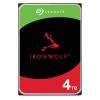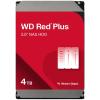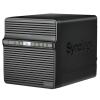Many popular cloud storage providers have been adjusting their available plan options recently, including the biggest names such as Google Drive, and Dropbox. There are new plans on offer, and looking closely at the personal paid cloud storage on offer Dropbox is leading with 3TB 'essentials' cloud storage plan for around $17 per month, with Google offering their 5TB cloud storage plan at around $43 per month.
From a personal use point of view, a few terrabytes is quite a lot of storage space for most people, and looking at the hardware for comparison a 4TB Hard Drive is around $240 to own - so give or take 2 years of cloud service subscription to reach that value.
Of course, that HDD can't be easily accessed via the internet, unless we plug it into a compatible router or similar - so let's take a look at some of the options in NAS which could bridge that gap. (NAS stands for Network Attached Storage.) Very basically speaking, a NAS is a box that connects storage drives to your router which in turn connects to your network and onto the greater Internet. A NAS will typically include a software interface so you can send files up and down easily from your PC, smartphone, or TV etc.



There are lots of NAS available, and these offer a varying amount of Drive Bays in which you can slot your hard drives, so if your needs grow over time, you can upgrade the size of your drives to suit. The most popular NAS is the two-bay version, with many users using features of the NAS software to automatically backup one drive to the other, so important files, such as family photos, are doubly saved.
When it comes to Cloud Storage for business, the benefits of having your own private cloud storage become even greater, with additional points around 100% data ownership, flexible storage size and local access being commonly mentioned favourites.
Shared storage in general has proven itself as the preferred option for many businesses, with a significant number of essential files now stored using cloud solutions. However, it is anticipated that spending on cloud storage will continue to increase, and this swift data growth poses a major challenge as storage costs increase, and retrieving/downloading a large amount of data back from a cloud service can be difficult. Many businesses also found they have limited control over public cloud servers, resulting in no access to their files at times, which is a significant concern if that data is required to do business.

The Synology brand offers NAS solutions for every storage need, featuring a diverse range of models and expansion units that can handle anything from modest file volumes to massive quantities of data, all without monthly fees. Businesses can begin with smaller setups and scale up by adding larger drives or expansion units as their data requirements grow.
As hybrid and remote teams become the norm, efficient collaboration and file updates can be challenging. Synology's cross-office file management solutions seamlessly sync data across multiple sites, ensuring the latest versions of files are always accessible, plus, with their efficient backup and snapshot technology, there is added peace-of-mind for those moments when accidents happen.
If you've been looking at your Cloud Storage spend recently it's a good time to look at the value and features of NAS, and be sure to keep your eyes on the Synology Store for more of the latest!







